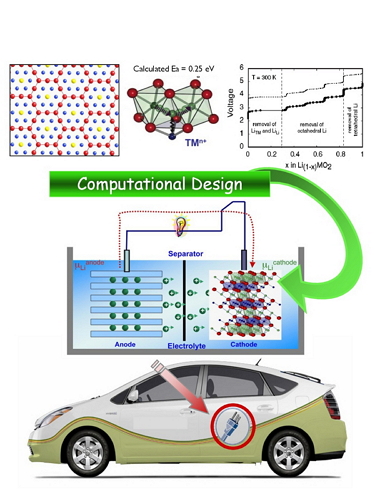COMPUTATIONAL DESIGN OF INORGANIC MATERIALS
|
Description |
The group designs promising materials without the need of any experimental effort. For that, we use first principles calculations, which correspond to the use of the knowledge of the composition of a material to predict its properties. Main activities are developed in the field of materials for energy, in particular, electrode materials for rechargeable batteries.

First Principles Calculations acelerate the desing of novel materials
|
How does it work |
The approach of using only the knowledge of the composition of a material to predict properties is referred to as a first principles or ab-initio calculations. In a first principles calculation, for a material with a given composition, the only input required is crystal structure. Direct output of first principles calculations are energies, band structure, charge density, lattice parameters, bond lengths and so forth.
|
Advantages |
Successful first-principles methods can bring obvious advantages to material research because no experimental input is needed, and the behavior of the material can be predicted before it is synthesized, making it possible to quickly focus on promising systems when designing new materials. Besides the search for novel materials with optimized properties, first-principles methods also have benefits for studying and understanding well-known systems.
|
Where has it been developed |
The experience of the group dates from 2000, when Dr. Arroyo was appointed post-doctoral associate in the Department of Materials Science and Engineering at the Massachusetts Institute of Technology, to undertake computational investigations in materials for energy storage. Dr. Arroyo is currently Associate Professor at Universidad Complutense de Madrid. The research interests of the group focuses on the combination of experimental and computational techniques to investigate various areas of Solid State Chemistry, including materials for lithium ion batteries and transformations of solids under high pressure conditions. The group has hold several research contracts with the company Toyota Motors Europe aiming to develop cathode materials for rechargeable calcium batteries. This investigation has continuity in the CARBAT-FETOPEN project financed by the EU (for additional information https://www.ucm.es/earroyo/).
|
Contact |
|
© Office for the Transfer of Research Results – UCM |
|
PDF Downloads |
|
Classification |
|
Responsible Researcher |
Elena Arroyo de Dompablo: e.arroyo@quim.ucm.es
Department: Inorganical Chemistry
Faculty: Chemistry Sciencies


